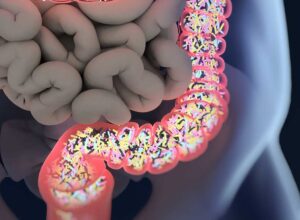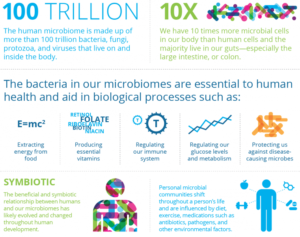Stop counting calories
Stop counting calories
You may think it’s crazy to say stop counting calories, but you will see when you start the Microbiome Diet, in that program you don’t count calories. However, the calorie-counting model is so prevalent that many of my patients cannot believe that I just wish they would stop thinking that way. After dieting for years, they have learned that body weight is the result of the number of calories taken in minus the number of calories burned. It is all a matter of willpower: will you be able to resist the temptation of the high-calorie treats you find on every corner? But I’ll tell you one thing: your microbiome is stronger and smarter than you are. A microbiome in imbalance will overwhelm you and make you feel the urge to eat sweets and harmful fats, slowing down your metabolism and increasing your appetite.
On the other hand, a balanced microbiome will make you feel like eating healthy foods, make you feel hungry and satiated at the right times, and, most importantly, will speed up your metabolism and make you burn fat instead of storing it. Listen to a healthy microbiome and you will never have to rely on willpower again. How do I know that counting calories doesn’t work? In developed countries, people in general consume far more calories than they actually need.
However, they are not fattening in proportion to these calories. One pound of human body fat contains approximately 3,500 calories. This means that if you consume five hundred extra calories every day, you must gain half a kilo per week, right? To make a comparison, five hundred calories are equivalent to half a package of popcorn at a movie theater, a bagel with a thick layer of cream cheese, or two glasses of wine and a few slices of cheese.
Most of us consume many of these extra calories every day. But few put on half a pound a week, and some people don’t put on any weight at all. Similarly, exercise contributes to a healthy weight, but we cannot measure this contribution by the number of calories. A twenty-minute run, for example, burns less than three hundred calories. This is not enough to produce significant weight loss. If we want to understand what makes us lose or gain weight, we have to do a deeper analysis.
Stop counting calories- Don’t count fats and carbohydrates
It is clear that the “calories in, calories out” model simply does not work. But what about the kind of calories you consume? Take a look at this study by Dr. Walter Willett, renowned professor at the Harvard School of Public Health.Dr. Willett administered three types of diets to 1,800 men and 1,500 women for twelve weeks. Two groups consumed the same amount of calories, but one group went on a low-fat diet, while the other went on a low-carbohydrate diet. The third group also ate a low-carbohydrate diet, but with three hundred extra calories. Three months later, the results were as follows: the group on the low-fat diet lost an average of eight pounds.
The group put on the low-carbohydrate diet lost a lot more, an average of 10.5 pounds. But the group on the low-carbohydrate diet, which had consumed more calories than the low-fat group, also lost more weight, an average of nine pounds. In other words, you can lose more weight by cutting carbohydrates than by cutting fat, even when you consume a higher amount of calories!
Along the same lines, Dr. David Ludwig, professor of nutrition at the Harvard School of Public Health, created an experiment with three groups of overweight children. Breakfast for all three groups had the same number of calories. However, one group had oatmeal with low fiber, another had coarse flaked oatmeal, rich in fiber, and yet another had an omelet with vegetables and a fruit. Lunch for all three groups was similar, and the children could eat whenever they were hungry.
The oatmeal group took in 81% more food than the omelet group, and the coarse flake oat group took in 50% more food than the omelet group. The oat-eating groups felt hungrier, and the children’s blood tests revealed higher levels of glucose, insulin, fat, and adrenaline, even though they had eaten the same number of calories. Dr. Ludwig’s experiment focused on the effect of carbohydrates on blood glucose and appetite. Like Dr. Willett’s study, this experiment is a valuable contribution to our understanding of nutrition. I hope that the two studies make it clear once and for all that simply counting calories will never lead to lasting weight loss, much less control a voracious appetite and decrease the urge to eat the “wrong foods.
However, I don’t want you to think either about “low-carb” or “low-fat”; I want you to think about your microbiome. The ideal diet is one that contains the kinds of carbohydrate and fat that contribute to the balance of the microbiome. Research on the microbiome was still in the early stages when Dr. Willett and Dr. Ludwig carried out their experiments. From what we now know, we can see that their low-carbohydrate diet worked, at least in part, because it both favored the microbiome. So to understand what are the forces implicit in raising blood sugar and insulin and increasing appetite and weight – and to really know what foods influence these forces – we have to go beyond fats and carbohydrates.
Stop counting calories – Simulated Surgeries and Weight Loss
I cannot resist the temptation to talk about yet another experiment, this time on the effects of gastric bypass bariatric surgery. I only recommend this surgery as a last resort, and if you do the Microbiome Diet, you probably won’t need this last resort. But the surprising results of this study confirm the key role of the microbiome in weight loss. As you know, bariatric surgery is a complex invasive procedure that alters the digestive process to reduce the number of calories the body is able to absorb. Doctors believed that calorie reduction was the reason for the procedure’s success – until, in March 2013, researchers conducted a revolutionary experiment.
They compared three groups of mice.
1) The first group underwent a simulated surgery, with no real effect, but performed to ensure that the surgical trauma itself did not influence the outcome. These untreated mice were then given unrestricted access to sweet and fatty foods, and obviously gained weight.
2) The second group did not undergo any surgery, only a calorie-restricted diet. Obviously, the mice lost weight.
3) The third group of mice actually underwent bariatric surgery, and then the mice could eat as much as they wanted. As you might expect, they also lost weight.
However, there were significant differences between the calorie restriction group and the gastric bypass surgery group. The mice in the diet group continued to have high insulin and glucose levels, where it becomes more difficult to stick to the diet, without regaining the pounds lost. If your insulin and blood glucose levels are high, you will be much more prone to have cravings for fattening foods. It is as if your whole body makes you predisposed to failure. You may have willpower for a few months, or even a few years, but in the end your metabolism, your appetite, and the desire to eat certain foods will prevail.
In contrast, the mice that had undergone the surgery showed normal insulin and glucose levels. Suddenly, their organism was no longer predisposing them to failure, but to success. In fact, after the surgery, they did not gain weight, even when they had unlimited access to food. So, if the success of the surgery was not due to calorie restriction alone, what else was it due to? The researchers believe that somehow the procedure “reset” the mice’s hormones, perhaps by altering their microbiome
Weight loss and metabolism are complex processes, an intricate hormonal dance that determines how blood sugar is processed, whether fat is burned or stored, and whether you feel hungry or satiated. When the hormones in your digestive and immune systems are out of balance, you eat food that you don’t need. You then convert this food into fat and put on weight.
When your digestive and immune systems are in balance
When your digestive and immune systems are in balance, you eat what your body needs, burn fat, and maintain a healthy weight. And, as Robert and many of my other patients have discovered, once you achieve this vital balance, you even have a “margin of freedom” to indulge in some excess. This is possible because the key factor is not the number of calories you consume, but how the body reacts to those calories.
Conclusion
Numerous studies confirm my observation. One group of researchers found that more than 80% of people who lose weight regain all of the weight lost, or even more, in a relatively short period of two years. Similarly, researchers at the University of California at Los Angeles (UCLA) looked at 31 long-term diet studies and found that about two-thirds of people who diet actually gain more weight in the next four or five years than they had lost at the beginning.
It is clear that conventional approaches don’t work. But the Microbiome Diet does. The more you learn about the microbiome, the more you realize that it is the secret to our metabolism, our weight, and our health. If you have a healthy microbiome and good gut health, your metabolism will automatically keep you at a healthy weight. If you have an unbalanced microbiome and poor gut health, you are virtually certain to gain weight. Fortunately for all of us, it really is that simple.


